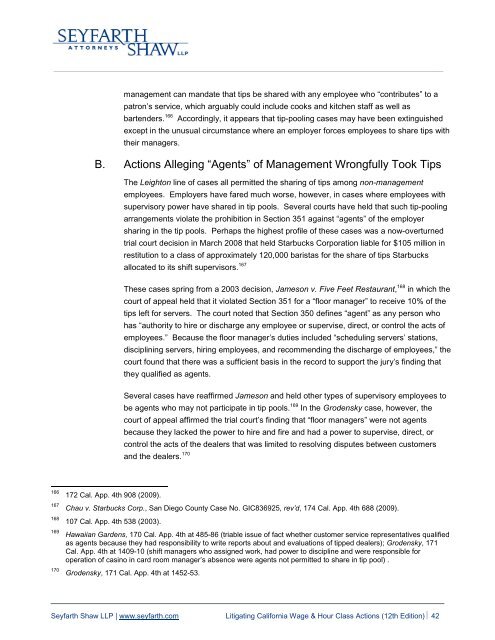Litigating California Wage & Hour and Labor Code Class Actions
Litigating California Wage & Hour and Labor Code Class Actions
Litigating California Wage & Hour and Labor Code Class Actions
Create successful ePaper yourself
Turn your PDF publications into a flip-book with our unique Google optimized e-Paper software.
management can m<strong>and</strong>ate that tips be shared with any employee who “contributes” to a<br />
patron’s service, which arguably could include cooks <strong>and</strong> kitchen staff as well as<br />
bartenders. 166 Accordingly, it appears that tip-pooling cases may have been extinguished<br />
except in the unusual circumstance where an employer forces employees to share tips with<br />
their managers.<br />
B. <strong>Actions</strong> Alleging “Agents” of Management Wrongfully Took Tips<br />
The Leighton line of cases all permitted the sharing of tips among non-management<br />
employees. Employers have fared much worse, however, in cases where employees with<br />
supervisory power have shared in tip pools. Several courts have held that such tip-pooling<br />
arrangements violate the prohibition in Section 351 against “agents” of the employer<br />
sharing in the tip pools. Perhaps the highest profile of these cases was a now-overturned<br />
trial court decision in March 2008 that held Starbucks Corporation liable for $105 million in<br />
restitution to a class of approximately 120,000 baristas for the share of tips Starbucks<br />
allocated to its shift supervisors. 167<br />
These cases spring from a 2003 decision, Jameson v. Five Feet Restaurant, 168 in which the<br />
court of appeal held that it violated Section 351 for a “floor manager” to receive 10% of the<br />
tips left for servers. The court noted that Section 350 defines “agent” as any person who<br />
has “authority to hire or discharge any employee or supervise, direct, or control the acts of<br />
employees.” Because the floor manager’s duties included “scheduling servers’ stations,<br />
disciplining servers, hiring employees, <strong>and</strong> recommending the discharge of employees,” the<br />
court found that there was a sufficient basis in the record to support the jury’s finding that<br />
they qualified as agents.<br />
Several cases have reaffirmed Jameson <strong>and</strong> held other types of supervisory employees to<br />
be agents who may not participate in tip pools. 169 In the Grodensky case, however, the<br />
court of appeal affirmed the trial court’s finding that “floor managers” were not agents<br />
because they lacked the power to hire <strong>and</strong> fire <strong>and</strong> had a power to supervise, direct, or<br />
control the acts of the dealers that was limited to resolving disputes between customers<br />
<strong>and</strong> the dealers. 170<br />
166<br />
167<br />
168<br />
169<br />
170<br />
172 Cal. App. 4th 908 (2009).<br />
Chau v. Starbucks Corp., San Diego County Case No. GIC836925, rev’d, 174 Cal. App. 4th 688 (2009).<br />
107 Cal. App. 4th 538 (2003).<br />
Hawaiian Gardens, 170 Cal. App. 4th at 485-86 (triable issue of fact whether customer service representatives qualified<br />
as agents because they had responsibility to write reports about <strong>and</strong> evaluations of tipped dealers); Grodensky, 171<br />
Cal. App. 4th at 1409-10 (shift managers who assigned work, had power to discipline <strong>and</strong> were responsible for<br />
operation of casino in card room manager’s absence were agents not permitted to share in tip pool) .<br />
Grodensky, 171 Cal. App. 4th at 1452-53.<br />
Seyfarth Shaw LLP | www.seyfarth.com <strong>Litigating</strong> <strong>California</strong> <strong>Wage</strong> & <strong>Hour</strong> <strong>Class</strong> <strong>Actions</strong> (12th Edition) 42
















